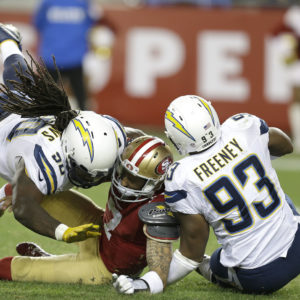Editor’s Note: For an alternative viewpoint, please see: Point: Standing Up for Justice by Kneeling During Anthem
As the NFL season opens players are expected to take a knee during the national anthem in protest of policing and our justice system. The protests were out of place to begin with, and the novelty of these free-speech expressions has worn off. It’s time for players to stop being a prime-time spectacle.
Former San Francisco 49ers quarterback Colin Kaepernick, the face of this NFL movement, explained last fall, “I am not going to stand up to show pride in a flag for a country that oppresses black people and people of color …”
Our justice system — like other big-government institutions — serves a critical function in our society, but has serious problems. Kneeling during the national anthem is an emotional response to problems that require other solutions.
These players should direct their activism elsewhere. Here’s why:
—There’s a difference between being an employee and an activist. As citizens, we are free to challenge, support and mobilize for — or against — any cause we’re passionate about. However, we don’t have unfettered free speech or free expression in the workplace — and for these players, the football field is the office.
The First Amendment limits only the government’s ability to suppress speech. Courts have consistently emphasized that they do not apply to private-sector employees.
NFL players are employees of their teams, and the teams belong to the National Football League. Franchises and the NFL can set rules, guidelines and expectations for players. They can also penalize behavior inconsistent with their rules or branding as they see fit.
While the NFL does not prohibit players from sitting during the national anthem, these demonstrations are damaging to an industry that ties its branding so closely to our national symbols.
As NFL Hall of Famer Franco Harris commented, “When (Kaepernick) steps out on that field, now it’s more than just him. It’s his teammates, it’s the NFL, and it’s the fans.”
Players suit up for the field in the same way that fast-food workers dress up for work. They bear the names, logos and visual branding of the company they represent. When customers get bad service from a waiter, they may hold the restaurant responsible by not eating there again.
The NFL is no different. Ratings have fallen and, according to recent polling, anthem protests top the reasons for why viewers are tuning out.
Kaepernick and other players are free to protest on their own time, but it should not be at game time.
—There’s a price to pay for activism. Black athletes have a history of using national sports to bring visibility to civil rights and other issues. Medal-winning sprinters John Carlos and Tommy Smith raised their fists in the air during the national anthem in the 1968 Olympics. Mahmoud Abdul Rauf refused to stand for the anthem during the 1995-96 NBA season, because he believed it went against his religious beliefs.
Some athletes paid a price. Muhammad Ali refused to fight in the Vietnam War and was stripped of his heavyweight title. Carlos and Smith were banned for life from the Olympics and Abdul Rauf gave up his promising NBA career — fading into obscurity.
The loss of glory, endorsements and lucrative contracts are costly, but they pale in comparison to the bloodshed to defend our country. Protesting the national anthem and our flag demonstrates irreverence for the sacrifices of those who pay the ultimate price for our freedoms — including our displays of defiance.
—The national anthem is a rallying cry for unity, not division. Penned by Francis Scott Key in 1814, “The Star-Spangled Banner” immortalized an important victory for our young nation. Key’s poem was a much-needed injection of patriotism and would become a unifying call for every American.
Today, our political leaders are unproductively partisan, our institutions are broken in ways that harm too may Americans, and our citizenry is disengaged. But, our nation is still full of promise, opportunity and hope.
Players exploiting high-visibility moments to protest the symbols of our unity are out of place and end up working against productive efforts to tackle these problems. Instead of enlightening uninformed Americans and gaining public support for efforts like criminal justice reforms at the federal and state level, these protests are distractions.
Unless taking a knee during the national anthem changes our justice system and policing for the better or fosters greater trust between communities of color and law enforcement, it’s time for these players to stand up and find a find better way to pursue policy and social change.

